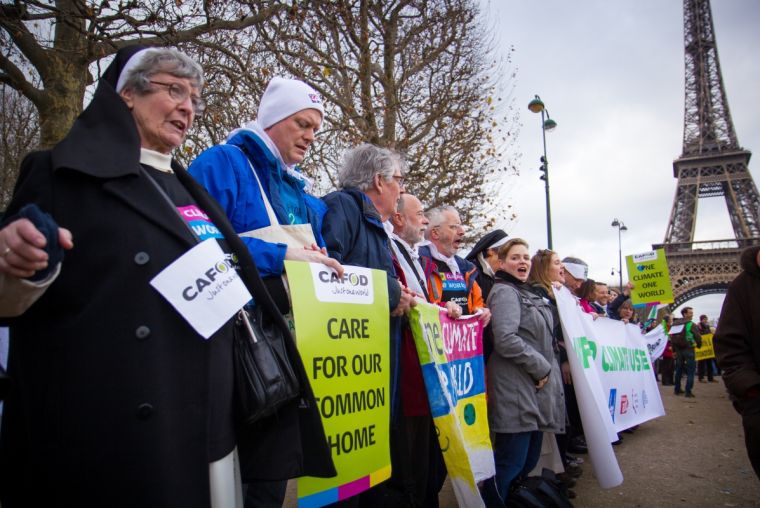Christians are putting their money where their morals are on climate change
The Trump administration's attempts to gut climate regulation have pushed climate change back to the top of the news agenda. But away from those headlines, Christian efforts to care for our common home are gathering momentum.
The need for action is indisputable. 2016 was the hottest year on record, taking the title held by both 2015 and 2014 before it. For the world's poorest and most vulnerable people, these records find their expression in deadly floods in India and the US and hellish heat waves and water shortages in Australasia, Africa and the Middle East. Climate change means the loss of livelihoods and lives of our sisters and brothers around the world: what Pope Francis calls 'the cry of the earth and the cry of the poor'.

The consensus achieved around the road map laid out by the Paris Agreement can't and shouldn't be derailed by the one head of state swimming against the tide. Yesterday, the White House announced that Donald Trump would make a decision on whether to pull the US out of the landmark Paris Agreement on climate change later this month. On top of cuts to the Environmental Protection Agency and an executive order designed to make life easier for polluters, such a move would add further distance between Trump and economic and scientific reality as he seeks to evade responsibility for reducing emissions of polluting greenhouse gases. Not only does this put him at odds with public opinion, it also puts the public at risk.
The power of money
However, as so often in the past, Christian communities are looking within themselves to make progress. Groups ranging from Catholic universities to religious orders are moving money they hold in shares, pensions and other investments away from fossil fuels to prevent the changing climate pushing people deeper into poverty. This 'divestment' is part of the momentum behind Pope Francis's leadership on climate change, which has already seenhundreds of thousands of Catholics sign petitions, take to the streets or even walk and cycle to Paris ahead of the UN climate talks in 2015. Church financial action has also seen more than 3,500 UK churches, and many parishioners, switching to renewable energy.
Just today, nine Catholic institutions – including St Joseph's Province of the Congregation of the Passion in the UK, and MGR Foundation and The Wheaton Franciscan Sisters, Daughters of the Sacred Hearts of Jesus and Mary in the US – broke records of a different kind as they made the largest ever joint Catholic divestment announcement, pledging to rid their portfolios of shares in the coal, oil and gas companies responsible for climate change.
This continues the momentum I saw earlier this year at a conference in Rome showcasing how Catholics have been waking up to the power of our money to fight fossil fuels. The Catholic orders, educational institutions and health care providers at the conference explained how they are putting the money that would otherwise finance pollution into the protection of our common home. One example was that given by Dignity Health, a Catholic non-profit healthcare provider, which is moving its money into renewable energy sources. Another example is the Franciscan Sisters of Mary, who have reinvested their finances into conservation schemes and projects which provide people in Kenya with solar-powered lights in their homes.
Bringing power to the people
From CAFOD's perspective as an international development agency, the ideal option is that which invests money in measures which help people in developing countries to access renewable energy. This finances the fossil fuel industry's competitor industry, striking a blow against a business model which leads to the extreme weather than pushes people into poverty. But it also provides clean, reliable, safe and – importantly – affordable access to energy for some of the 1.1 billion people worldwide living in energy poverty. It empowers people, providing lights for children doing homework, fridges to keep vaccines in health clinics, and water pumps to irrigate land for farmers. Our 'Power to be' campaign calls on the World Bank to shift more of its spending to renewable energy for these reasons.
Divestment makes sense
There's an added motivation for Church groups to divest and reinvest in renewable energy: it is sound economics. The Governor of the Bank of England, Mark Carney, is one figure from the world of finance to warn that fossil fuel investments risk becoming 'stranded assets' with the momentum behind the transition to renewable energy. In other words, those who keep their money in fossil fuels will lose that money.
The situation for coal is especially bleak. The International Energy Agency has forecast that coal's share of power generation will fall 12 per cent from 2014 levels by 2021. Here in the UK, we recently went our first full day without coal power since the Industrial Revolution. France, Finland and the UK have all committed to ending coal power in the coming decade.
By contrast, the renewable energy industry is booming. Costa Rica powered its electricity grid almost entirely without having to burn fossil fuels last year. From China to the US, half a million solar panels were installed every day in 2016. The sector employs more people than coal – 9.4 million people compared to 7 million. The Paris Agreement has provided further impetus for the transition to renewable energy and served notice on fossil fuels.
Donald Trump must choose whether to remain isolated on the issue that will define our time. The rest of us should vote with our money, sending a signal to those who are damaging our common home by helping to finance its protection.
Neil Thorns is director of advocacy at CAFOD











